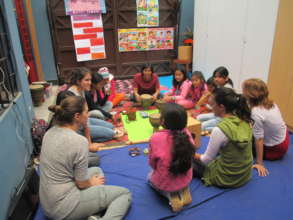BGR Staff
8. Haiti: Feeding Children in Jacmel

Our partner, the Art Creation Foundation for Children, was started in 1999, with the mission “to build a passionate community of future leaders, visionaries and dynamic thinkers,” empowering young people through art and education. A hundred young people are currently enrolled in their programs. Our partnership will help ACFFC maintain its after-school and summer feeding program, which has been affected by the recent increased cost of staple foods in Haiti. Children in this program do not otherwise have access to regular meals. Most would eat less than three meals a week if not for the program.
Since ACFFC provides tuition for their education, the feeding program is tied closely to their education program, and in fact the latter might not exist without the feeding program. Children who are hungry do not perform as well as those who have access to food, for their concentration levels are lower. Without the feeding program some of the children would not even show up for school, but instead choose to find other ways to obtain food each day. The after-school feeding program provides many of the children with the only meal they may have access to, Monday through Friday, and provides breakfast and lunch on Saturdays and during the summer program. Annually renewable program.
9, Haiti: Food Aid Program in Jacmel NEW PARTNER

The Joan Rose Foundation (JRF) is a U.S. registered non-profit based in Bloomfield Village, Michigan. Its mission is to improve the lives of vulnerable Haitian children and their families. In October 2010 they opened in Esperanza, Dominican Republic, serving Haitian refugees in the country. In September 2015, to escape the discrimination against Haitians by the Dominican society and government, they moved operations and 23 core families to the Bois Boeuf neighborhood of Jacmel, Haiti.
The Food Aid and Food Security program sponsored by BGR will be implemented by JRF in Bois Boeuf, Jacmel. The beneficiaries of the project are the 115 people that live in the community. The project duration is twelve months. The objectives of the program are: (1) to provide children with two nutritious meals every day, supplying about 80 percent of their daily recommended calorie intake; (2) to incorporate healthy eating habits and improve the educational level of families; (3) to lessen the financial burden on families while they settle in Jacmel; (4) to help the community increase self-sufficiency and food security by creating a community garden; and (5) to strengthen community participation and organization.
To fulfill these objectives, the project will provide two meals daily, from Monday to Saturday, for the children of the JRF community. JRF will also offer a training workshop to the parents about healthy eating patterns and well balanced diets and create a community garden. Continue reading →











